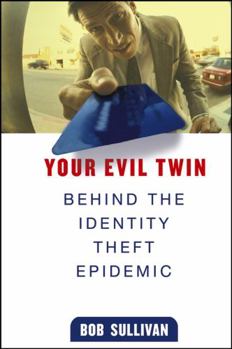Your Evil Twin: Behind the Identity Theft Epidemic
Select Format
Select Condition 
Book Overview
The crime of the twenty-first century doesn't discriminate: ID theft has hit ordinary citizens and celebrities alike, from Oprah Winfrey to Steven Spielberg, and costs the economy $50 billion a year. Your Evil Twin covers this exploding crime from every possible angle. It includes exclusive whodunit details from mastermind identity thieves who have pilfered money from half the members of the Forbes 400, as well as exclusive interviews with a myriad...
Format:Hardcover
Language:English
ISBN:0471648108
ISBN13:9780471648109
Release Date:August 2004
Publisher:Wiley
Length:314 Pages
Weight:1.25 lbs.
Dimensions:1.1" x 6.5" x 9.5"
Customer Reviews
3 ratings
Humanizing Identity Theft
Published by Thriftbooks.com User , 19 years ago
Much has been written about identity theft, and what people have to go through to clear their credit reports. But what I had never given much thought to is that identity theft goes much beyond stealing identities for financial gain. In fact, what is much more difficult to deal with is when your identity is stolen and used by criminals in general. Try to clear a supposed criminal record. And if you are in the United States, try to do that if you are black or Hispanic. That is just part of the excellent discussions you will find in Bob Sullivan's Your Evil Twin: Behind the Identity Theft Epidemic (August 2004, John Wiley & Sons, 314 Pages, ISBN 0471648108). A journalist by training, Sullivan presents an easy to read, if unsettling, narrative talking about different aspects of identity theft that do not often get discussed. Some of the material is material found in magazines and other journals, but the strength of this book is that it beings many different pieces into one place. Sullivan starts out by showing that no one is immune to identity theft, whether it be a CEO or even Eldrick "Tiger" Woods. He goes into some detail explaining who was taken advantage of and how, though he does not offer solutions for the problems. But this does not mean he is afraid to take on the real villains in identity theft, the credit card companies and retailers who push easy credit every chance they get. Sullivan makes the excellent point that the availability of easy credit is actually better for the bad guys than those who do the right thing. He also does not shy away from calling out the credit reporting agencies and their role in this problem. Why should they be charging people for "Credit report watches", when they helped create the problem? It was fascinating from a historical perspective to read how the three major credit reporting companies came to be. It is a heck of a trivia question to ask how a railroad fits into the scheme of things. You will, or at least should, find yourself challenged by the reality that the race factor plays in how victims are treated. Like it or not, we live in two Americas as clearly shown in the aftermath of Hurricane Katrina. Discussions of this topic in the book really offer a time for reflection and thought in the area of identity theft. One should not expect this book to answer every possible question about identity theft, but should be considered as part of a larger library on data privacy and identity theft. It provides a human perspective that other titles on the subject often lack. Who Should Read This Book? This book, while not a "must read" would be of interest to people who want to explore more of the human side of identity theft and would like some additional historical/political perspective. The Scorecard Birdie on an average Par 4
Almost Like a good mystery book, but real
Published by Thriftbooks.com User , 20 years ago
This book is all about a problem that simply didn't exist only a few years ago. Now it's become the fastest growing white collar crime in America. It strikes in every community from the smallest to the largest. The crime is profitable, nearly unpreventable, and hardly ever prosecuted (by one estimate only one out of every 700 incidents). It's the down side of the information super highway. Getting a bit of information about a person is easy, and then you can get a bit more. Soon you can buy a car in his name, get credit cards in his name, like the TV commercial, you're on the beach, your credit cards are in the airplane flying by. The book says, rightfully I believe, that you are basically on your own. The police don't seem to care, the credit card companies write off the loss and go on about their business. Just don't you try to ever use your credit again. The author is a leading expert on the subject, as well as being a senior writer at MSNBC. He knows how to write and he knows his subject, what more can you ask.
The risk is very real!
Published by Thriftbooks.com User , 20 years ago
Ignorance is not bliss - it only gives more time for identity thieves to ruin your life. I already own a shredder, to indulge my paranoia of having credit card applications and other personal information easily available to those with sinister intentions. This book confirms the need for the paranoia, but also points out how little control I have over "keeping" my own identity. This is a page-turner, flavored with stories of real people who have experienced identity theft, making it a very interesting read. This issue is huge, much more than someone trying to run up some charges on a credit card I have in my wallet. And what I found particularly shocking was how unwilling different institutions are to come up with solutions.






